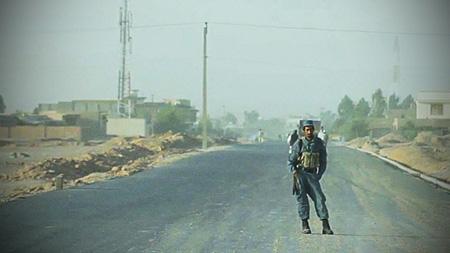"My Afghanistan" shows us children throwing rocks at passing columns of foreign military vehicles. We see their fathers encouraging them and otherwise urging them to steal whatever they can from the foreign troops. We see roadside bombs sitting in living rooms and later listen to incoming calls from the "freedom fighters" who detonate them hoping to hit as many foreign soldiers as possible. We see families with terrified children huddling in their rooms while firefights boom right outside their houses. And we see wounded civilians in hospitals that remarkably often have been hit by bombs from the international forces.
"Total alienation enables us to kill each another. The kind of images this film presents us with gets the dialogue going again."
Nagieb Khaja's film provides an image of a mission gone wrong. A vast chasm separates the Afghans and the foreign troops. The "hearts and minds" strategy has run aground, not just because of local cultural patterns and general poverty but simply because of the Afghans' sense of being occupied. They are sick and tired of the presence of foreign troops.
When our team made "Armadillo" in 2009-2010, Nagieb was one of the people I looked up to gain greater insight into the challenges faced by Afghanistan and learn something about how ordinary Afghans viewed the war being waged in their country.
It quickly became clear that the stories I encountered from the Danish authorities did not measure up to the accounts Nagieb gave me. He was already working on "My Afghanistan" at the time and I tried to push mine up, so that we could bring out our films at the same time. Two pieces of the same picture: the soldiers’ perspective versus the locals’ perspective.
Nagieb's film would cast a light on some of the things that, to us, had to be told as assumptions and mutually suspicious guesswork. I remember thinking how interesting it would be if we could have sat in an Afghan village and observed the war from there. Nagieb Khaja's film allows us to do that.
One of the most telling clips in the film comes when Nagieb interviews a security guard at the protected zone where journalists stay in the provincial capital of Lashkar Gah. He goes home every day through Taleban-controlled territories, wearing his uniform as an unequivocal sign that he is not working for the local governor and thus for the NATO-led ISAF forces. "They don't bother me. We have a deal that if I leave them alone, they leave me alone." Even so, the Afghan police headquarters in town is a target for rebel bombs. The reality of the war in Afghanistan is a complex tapestry of the dilemmas that arise when local negotiations of power structures are conducted among a people who are above all simply trying to survive.
Nagieb's film is a unique and welcome window into ordinary Afghans' own stories of survival, family life, the fear of being collateral damage and their modest hopes and dreams for the future. In fact, we are seeing what we already know – that these are human beings behind the weather-beaten faces and earth-toned clothes.
Yet we are also surprised. The world of family, love and desperation that Nagieb's people lets us into is almost overwhelming, and that makes me think that this feeling only arises because our alienation from these people is so shockingly great. War is when dialogue ends and weapons speak. Total alienation enables us to kill each other. The kind of images this film presents us with gets the dialogue going again.
"Armadillo" – a milestone film
"'Armadillo' is an earthquake in the nation's self-image," one Danish critic said upon its release in 2010. In fact, the film made more headlines in the media than any other film ever, showing the dark side of Denmark at war. Following a group of young soldiers serving their first mission, Armadillo traces their friendship and the dehumanising effect of war as the fighting gets tougher and operations increasingly hairy. Winner of the Critics' Week Grand Prix in Cannes 2010 and numerous other awards, including an Emmy for best editing (Per K. Kirkegaard) at the 2012 News & Documentary Emmy Awards.
